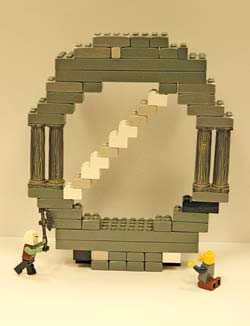|
News |
|
To fear or to worship...the zeroTo fear or to worship...the zero
The ancient Greeks had split beliefs on the powers of the number ‘zero.’ The Dead Mathemeticians Society will discuss its importance Tuesday
The Advocate
The MHCC community will have a chance Tuesday to find out why nothing is important.
Nothing . . . as in zero.
Understanding the concept of zero led to invention of a numbering system that works well, according to math instructor Jon Spindor, and that’s why it will be the star of the show next week.
|
||
“Zero” will be the main focus of a Dead Mathematicians Society event Tuesday at 3:15 p.m. in Room 1710. But it won’t be all numbers and formulas and equations.
Spindor will be joined by Andy Gurevich, MHCC philosophy and religions instructor. The first half of the event will be a mathematical view presented by Spindor, while the second half will be a philosophical perspective offered by Gurevich.
“I want to discuss some of the reasons why zero took so long to take hold mathematically and look into why zero wasn’t necessary for so long,” Spindor said. “It really was a big leap to discover something that represents nothing. Now that we are comfortable with zero, and have really never known life without zero, it’s kind of difficult to think of life without it.”
Archeologists found proof of the number zero dating from about 700 B.C. Babylonian mathematicians used zero as a symbol to indicate the space between sexagesimal numerals. Sexagesimal is a numeral system with 60 as the base.
“I want to show why zero is so important to our mathematics and how it helps us every day,” Spindor said. “There are also some troubling aspects of zero that I would like the audience to play with, such as why can’t we divide by zero? What is 0^0 (zero to the zeroth power)? What is 0/0 (zero divided by zero)?”
Ancient Greeks were unsure about the status of zero as a number and by the medieval period, religious arguments about the nature and existence of zero started to develop.
“While I will bring in some topics relating to calculus, most of the math will be very accessible. If someone doesn’t understand all of the math, he or she can just tune me out until it’s Andy’s turn,” said Spindor. He said the seminar is designed for a general audience, not just mathematicians.
“Zero was a long ignored and even (a) shunned idea that finally took hold both mathematically and religiously,” he continued. “While some numbers are extremely important in mathematics (such as one, pi, e and i), I don’t think any have the same significance philosophically.
“Something that represents nothing is really kind of a weird thing and it turns out it is a very powerful and important thing. The acceptance of zero really did change the way we view the world,” said Spindor.
The concept of zero as a number and not merely a symbol for separation is attributed to India where calculations were carried out using zero.\The event is part of the ongoing Infinite Enrichment series from the Dead Mathematicians’ Society.
However, the class event will be different from a math course because the event will be purely for intellectual stimulation. A math course has a set curriculum with goals and outcomes that students must master before going on to the next level, Spindor said.
“This particular even will be unique because it addresses a mathematical topic from both a mathematical and religious perspective,” Spindor said. “We all take zero for granted and this will be an opportunity to bring to light a few of its significant aspects.”

